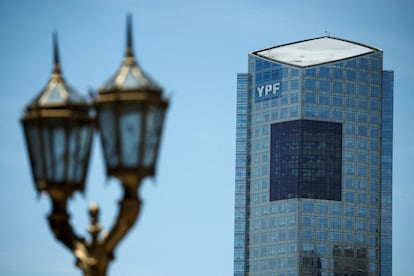The complications of Milei’s plan to privatize YPF in Argentina: A pending payment of $16 billion
The president-elect will need the support of the oil-producing provinces, which own 24% of the company’s shares

Argentina has been here before, but a privatization of the state energy company, Yacimientos Petroliferos Fiscales (YPF), will not be like it was the first time in the 1990s. After the government of Cristina Fernández de Kirchner expropriated it in 2012, a legal trial was opened in the United States that remains unfinished. Furthermore, a large percentage of the shares are in the hands of the oil provinces in Argentina. Neither U.S. law nor international law can prevent a second sale from taking place, but the road will be uphill for president-elect Javier Milei.
Founded 101 years ago, YPF was the first state-owned company outside the Soviet Union. Between 1990 and 1998, President Carlos Menem privatized a handful of banks and state companies, including YPF, which generated $19.3 billion in revenue for the government, according to estimates by the academic Richard Huizar, a political science researcher at William Patterson University in New Jersey. According to Huizar’s analysis, the sale of YPF at that time occurred because the country stopped depending on oil revenues and there was a weakening of the unions. Its shares were listed on the Buenos Aires and New York stock exchanges.
It was then that Spanish oil company Repsol became a majority shareholder of YPF. At the end of 2011, Repsol announced the discovery of Vaca Muerta, then the largest oil field in history (for both Argentina and Repsol). A few months later, President Cristina Fernández de Kirchner announced that she would expropriate the company, taking control of 51% of the shares. The Spanish company responded with a legal suit in the United States, which it eventually sold to the American fund Burford Capital.
In September, Burford scored a victory when a judge in New York ruled that the Argentine State must pay compensation of $16 billion to Burford and other affected companies. For Burford, payment from the Argentine government would imply a return on its investment of 37,000%, according to what its investment director told Bloomberg, but the payment has not arrived. The Argentine government responded that it will appeal the ruling.
“In terms of U.S. law and international law, I see no impediment to the sale being made,” said Diego Durán de la Vega, director of Latin American disputes at the Washington-based law firm Hughes Hubbard. “YPF is already partially private, with 49% of its shares on the stock market and if Argentine law allows it and following the established process, it could sell its 51% position to private investors,” added the specialist. Investors reacted with optimism in both New York and Buenos Aires,
“As for the conviction in the United States, it is important not to lose sight of the fact that even though the case for which they condemned Argentina is related to YPF, the conviction is against the Argentine State, regardless of what happens with YPF,” Durán clarified.
Finally, a second obstacle that Milei will have to overcome to make the sale of YPF a reality is to get the oil provinces, members of the Federal Organization of Hydrocarbon Producing States (OFEPHI), to agree to the privatization: 51% of the shares are owned by the state, while 49% belong to Río Negro, Tierra del Fuego, La Pampa, Santa Cruz, Chubut, Neuquén, Salta, Mendoza, Jujuy and Formosa. This means that 24% of the company’s total shares are in the hands of the provincial governments. In 2012, when Kirchner confronted Repsol, the provinces where the oil company operated withdrew, one by one, the licenses, exerting pressure for expropriation.
Given Milei’s announcement of his intention to privatize state companies, including the energy company Enarsa, as well as the public media outlets, the markets reacted with optimism, boosting the price of YPF shares as well as sovereign bonds. But analysts warn that privatizations are not guaranteed. “Milei has proposed fast and radical measures to address these imbalances, including dramatic cuts to federal spending, full dollarization, closure of the central bank and privatizations,” analysts at credit risk and analysis firm Fitch wrote on Tuesday.
“Yet the dubious technical feasibility of these plans and the recent moderation in his rhetoric make it uncertain how ambitious an agenda he will pursue,” Fitch warned.
Sign up for our weekly newsletter to get more English-language news coverage from EL PAÍS USA Edition
Tu suscripción se está usando en otro dispositivo
¿Quieres añadir otro usuario a tu suscripción?
Si continúas leyendo en este dispositivo, no se podrá leer en el otro.
FlechaTu suscripción se está usando en otro dispositivo y solo puedes acceder a EL PAÍS desde un dispositivo a la vez.
Si quieres compartir tu cuenta, cambia tu suscripción a la modalidad Premium, así podrás añadir otro usuario. Cada uno accederá con su propia cuenta de email, lo que os permitirá personalizar vuestra experiencia en EL PAÍS.
¿Tienes una suscripción de empresa? Accede aquí para contratar más cuentas.
En el caso de no saber quién está usando tu cuenta, te recomendamos cambiar tu contraseña aquí.
Si decides continuar compartiendo tu cuenta, este mensaje se mostrará en tu dispositivo y en el de la otra persona que está usando tu cuenta de forma indefinida, afectando a tu experiencia de lectura. Puedes consultar aquí los términos y condiciones de la suscripción digital.









































